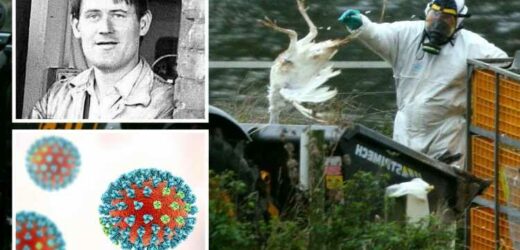THE first Brit infected with a deadly strain of bird flu says he is devastated his beloved ducks were culled – but says he does not feel ill.
Dad-of-three Alan Gosling contracted avian flu after befriending a flock of wild ducks before looking after them at his home in Buckfastleigh, Devon.
The 79-year-old was ordered to test for the disease after a local flock of 160 local ducks came up positive and were culled last week – including 20 that lived in his house.
The Muscovy ducks originally lived in a public area near his home.
Duck expert Alan started to feed them, eventually becoming friendly enough over a number of years that he was able to bring them to his property to live with him.
Alan described the last two weeks as “like a nightmare” and, while he feels "fine" physically, he said he was gutted to now be living without his treasured ducks.
The retired train driver said: "I'm totally fine myself – I am just upset about what happened to the ducks. I'd been with them for more than 20 years so it's a huge loss.
"They were my family – they were my life."
Most read in Health
HOL WE GO! Huge holiday boost as ALL travel tests may be ditched as jabs set us free
Daily UK Covid cases fall for SECOND day as 179,756 new infections recorded
The 345 places where Covid cases are still rising – is YOURS on the list?
Top 20 Omicron symptoms revealed as major study pinpoints signs to watch for
Alan said he had been tested constantly by the authorities – but doesn't feel ill.
"Apparently I have got the virus, as far as I can tell I have no ailments whatsoever," he said.
"They’ve been taking samples for me so they can work out what to do to stop others from getting it.
"I'm quite pleased to be able to help them. They’ve taken sample after sample."
The Health Security Agency (HSA) today confirmed a case of avian flu in the South West region.
Alan's daughter-in-law Ellesha Gosling, 26, said he first began to notice several ducks of his huge flock becoming sick a few days before Christmas.
After DEFRA and APHA got wind of his close contact, and they were culled in a bid to prevent the spread, shortly after Christmas.
Ellesha, from Cranbrook, Exeter, said: "It has devastated him."
And divorcee Alan, who is also a grandad, called the culling of his ducks "way over the top".
I'm totally fine myself – I am just upset about what happened to the ducks. I'd been with them for more than 20 years so it's a huge loss.
He said: "I believe that not looking after wildlife is one of the biggest problems of today and I've always done my best to look after wildlife.
"What happened to the ducks was way over the top – I know they would have known what was happening.
"People don't realise they are intelligent, but also so sweet. They used to sit on my slippers to warm them up for me before I put them on.
"Or I'd go downstairs and have a cup of tea and a biscuit – it'd sit with them and give them some of the biscuit too.
"The house was never empty and I was never alone. Now it's like a morgue."
Ellesha said the family have "been through hell", adding she and her husband Richard Gosling, 47, have been unable to see their relative since the outbreak.
"The past couple of weeks have been hell for this family. He saw all of his ducks killed, and they were like his closest friends," she said.
"And now he is stuck at home on his own while tests are run to find out if he has the disease too – and we still haven't had the result confirmed to us.
Symptoms of bird flu:
Call a GP or NHS 111 if you experience any symptoms of bird flu and have visited an area affected by bird flu in the past 10 days.
The main symptoms of bird flu can appear very quickly and include:
- a very high temperature or feeling hot or shivery
- aching muscles
- headache
- a cough or shortness of breath
Other early symptoms may include:
- diarrhoea
- sickness
- stomach pain
- chest pain
- bleeding from the nose and gums
- conjunctivitis
It usually takes three to five days for the first symptoms to appear after you've been infected.
Within days of symptoms appearing, it's possible to develop more severe complications such as pneumonia and acute respiratory distress syndrome.
"He is often on the phone to us, asking what the doctors have said – but we can't answer questions we don't know the answers to."
While the outside of the property has been partially cleaned, the family say the interior of the property remains contaminated until he is confirmed to be no longer infectious.
The family are keen to see the inside of the property cleared of contamination as they fear his condition could worsen, but say this has not yet taken place despite their pleas.
They say they have been told the cleaning of the inside of the house will have to be paid for by Alan – a further blow for the retiree.
The disease – also known as avian flu – is often found in poultry and wild fowl but rarely spreads to humans.
Until now, there have been no documented cases of the particular strain in Britain.
According to the World Health Organisation, fatality rates are around 53 per cent in humans.
A source said the case in a man from the South West was picked up after routine surveillance testing was triggered by infection in his flock.
He is currently isolating at home, with a source saying contact tracing has been completed and there is no evidence of onward transmission.
They added: “The risk to the public is very low. The case was detected as part of our surveillance systems in place around avian flu as it is something we need to take very seriously.”
'DEVASTATED'
Recent outbreaks in the South West were reported last month near Newent in the Forest of Dean, Gloucestershire, Buckfastleigh in Devon, Swindon in Wiltshire and Pokesdown in Dorset.
Cases elsewhere in the country were also confirmed in Herefordshire, Worcestershire, Warwickshire, Staffordshire, Essex, Leicestershire, Lancashire, North Yorkshire, Derbyshire, Cumbria, Cheshire, South Suffolk and Norfolk.
According to the NHS, no humans in the UK have been infected with four main types of bird flu – H5N1, H7N9, H5N6 or H5N8.
But there have been cases of different strains more than a decade ago.
Professor Isabel Oliver, Chief Scientific Officer at the UK Health Security Agency, said: “While the risk of avian flu to the general public is very low, we know that some strains do have the potential to spread to humans and that’s why we have robust systems in place to detect these early and take action.
"Currently there is no evidence that this strain detected in the UK can spread from person to person, but we know that viruses evolve all the time and we continue to monitor the situation closely.
"We have followed up all of this individual’s contacts and have not identified any onward spread.
“It remains critical that people do not touch sick or dead birds, and that they follow the DEFRA advice about reporting.”
Britain is currently facing its largest ever outbreak of bird flu with over 60 cases confirmed across the country since the start of November.
To help slow the spread, all keepers have been ordered to keep chickens, ducks, geese and any other birds indoors.
Bird flu is a notifiable animal disease as it can spread to people – and triggers mass culls of infected flocks.
UK’s Chief Veterinary Officer Christine Middlemiss said: “While avian influenza is highly contagious in birds, this is a very rare event and is very specific to the circumstances on this premises.
“We took swift action to limit the spread of the disease at the site in question, all infected birds have been humanely culled, and cleansing and disinfection of the premises is underway. This is a reminder that stringent cleanliness when keeping animals is important."
Prof Ian Jones, virologist at the University of Reading, said: “Transfer of avian flu to people is rare as it requires direct contact between an infected, usually dead, bird and the individual concerned.
"It is a risk for the handlers who are charged with the disposal of carcasses after an outbreak but the virus does not spread generally and poses little threat. It does not behave like the seasonal flu we are used to.
“Despite the current heightened concern around viruses there is no risk to chicken meat or eggs and no need for public alarm.”
Until now, most cases in humans have been found in China and the Western Pacific.
But fatality rates are high, with more than half of recorded cases dying from the virus.
According to the World Health Organisation, there were 863 cases of human infection with H5N1 strain since 2003, with 456 fatalities.
AVIAN OUTBREAK
Cases of infected birds have also today been reported near Eton College where Boris Johnson, Prince William and Prince Harry were pupils.
The exact location hasn't been revealed but DEFRA said a "captive bird monitoring controlled zone has been put in place around the premises, spanning three kilometres, and all birds there will be humanely culled".
It will alarm wildlife lovers because the 3km "killing zone" so close to Eton will cover the River Thames, where there are hundreds of swans – legally owned by the Queen.
It comes after the UK's chief vet warned last month there is a "phenomenal level" of bird flu in the country after tens of thousands of farmed birds were culled.
An Avian Influenza Prevention Zone was declared across the UK on November 3 before being extended on November 29 with the added requirement all captive birds had to be kept indoors.
This was done amid concerns that wild birds migrating from mainland Europe during the winter are carrying the disease.
The risk to human health from avian influenza remains very low, according to public health advice, and there is a low food safety risk.
Source: Read Full Article












